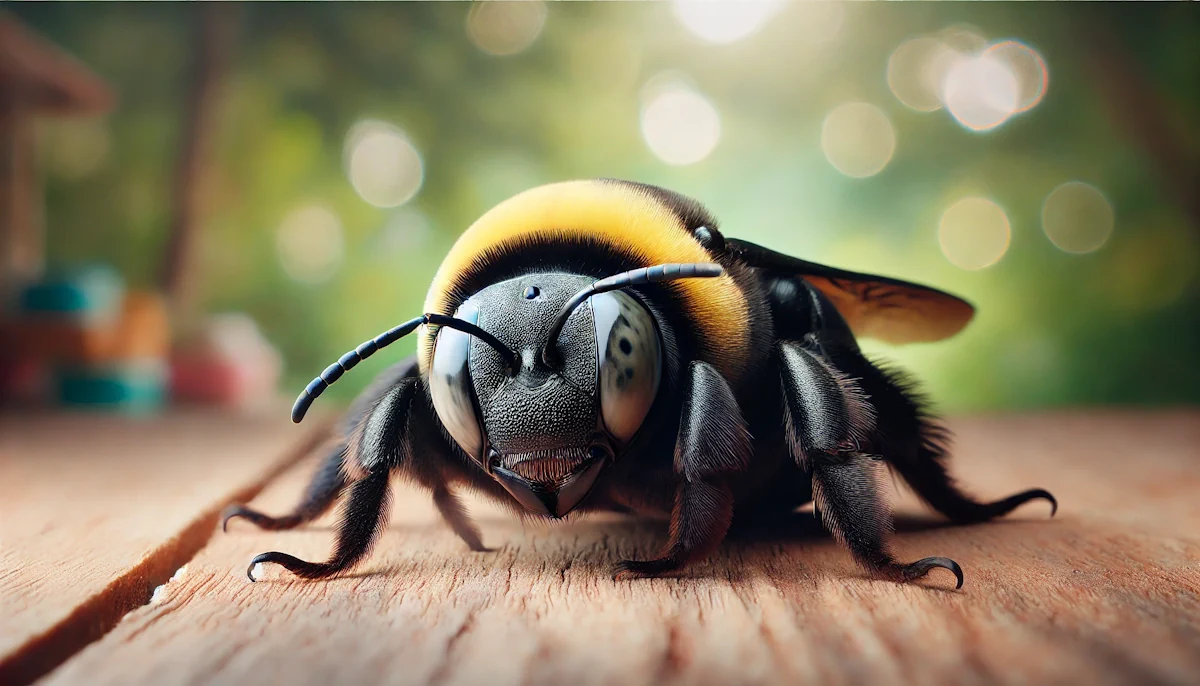Table of Contents
ToggleCarpenter bees, known for their large size and distinct buzzing, often appear intimidating. Their presence can raise questions about their behavior, particularly whether they are aggressive or likely to sting or bite.
This article provides clear, factual information about carpenter bees. We’ll discuss their behavior, the potential for stings or bites, and how to safely coexist with these fascinating insects.
Understanding Carpenter Bees
Carpenter bees are large, black and yellow insects commonly mistaken for bumblebees. However, unlike bumblebees, carpenter bees have a shiny, hairless abdomen. This is a key difference that sets them apart.
Unlike honeybees, carpenter bees are solitary and do not live in hives. They are known for their unique nesting habits, often creating tunnels in wood to lay their eggs.
Despite their daunting appearance, carpenter bees are generally not aggressive and tend to avoid human interaction.
Do Carpenter Bees Bite?
Carpenter bees do not bite. However, their intimidating flight patterns and proximity to humans can cause concern. Understanding their true behavior can help alleviate these fears.
Male vs. Female Carpenter Bees: Sting Potential and Behavior
Male carpenter bees are often seen hovering around nests and near people. This behavior can be mistaken for aggression. However, male carpenter bees cannot sting—they lack a stinger, making them harmless to humans.
Female carpenter bees, on the other hand, do possess a stinger. However, they are typically non-aggressive and will only sting if directly provoked. Recognizing the difference between male and female carpenter bees is crucial for assessing any potential sting threats.
Can Carpenter Bees Sting?
Yes, female carpenter bees can sting, but they are not naturally aggressive. Stings are rare and usually occur only when the bee feels threatened. Unlike honeybees, carpenter bees do not die after stinging and can sting multiple times.
However, encounters that lead to stings are uncommon, as carpenter bees generally prefer to avoid humans.
Misinterpreted Aggression: What Carpenter Bee Behavior Really Means
The hovering behavior of male carpenter bees is often misunderstood as aggression. In reality, this is a defensive behavior meant to protect their territory and attract females.
While this hovering may seem threatening, it’s important to remember that male carpenter bees cannot sting and pose no actual threat to humans.
Preventing and Managing Carpenter Bee Problems
Carpenter bees can damage wooden structures due to their nesting behavior. The tunnels they create can weaken wood over time, leading to structural issues.
To prevent carpenter bee damage, treat or seal exposed wood and use deterrents like citrus oil or almond oil. In cases of severe infestation, professional pest control may be necessary. After bees have emerged, sealing existing holes can help prevent re-infestation.
Experiencing Carpenter Bee Issues? We Can Help!
While carpenter bees are not aggressive, their nesting habits can lead to damage in wooden structures. If you’re in South Florida and dealing with a carpenter bee problem, our professional pest control services can help protect your home and maintain your peace of mind.
Contact us today to learn more about our effective solutions for carpenter bee infestations.
